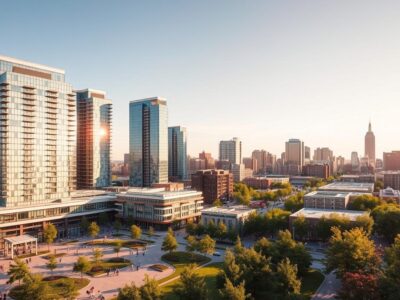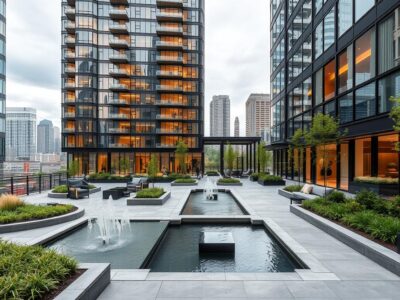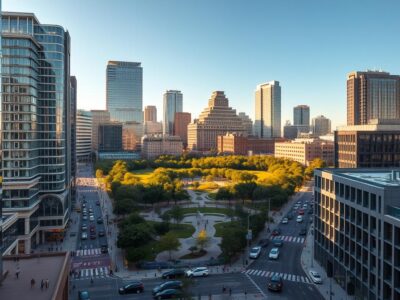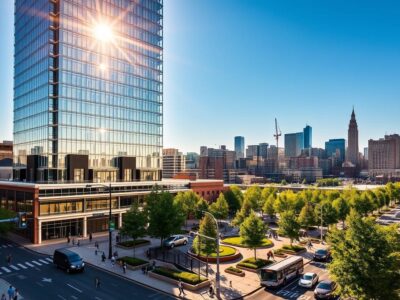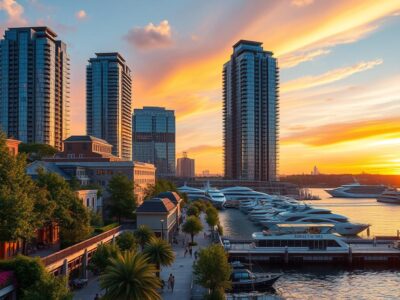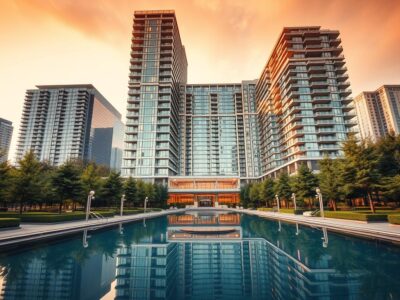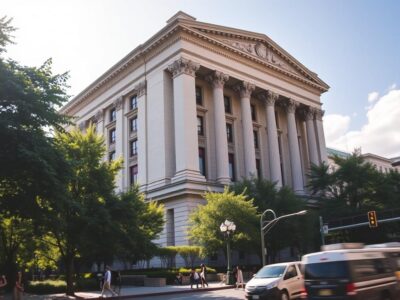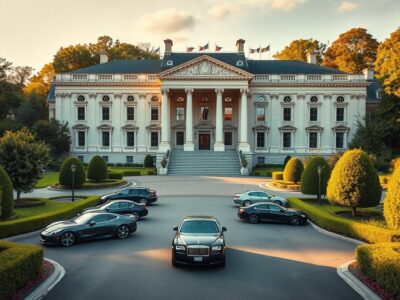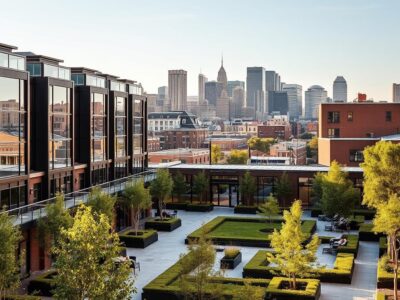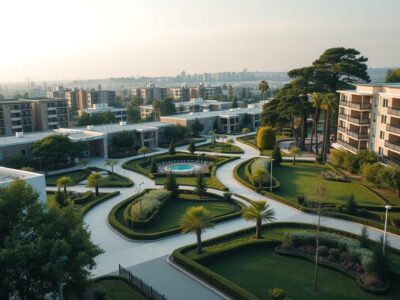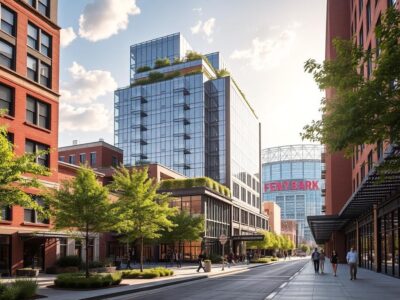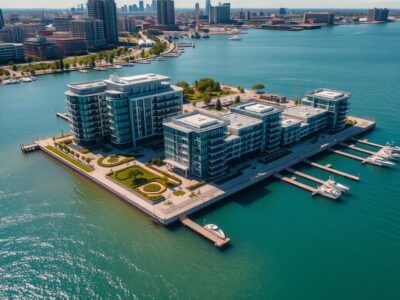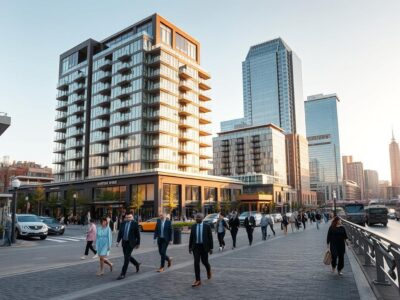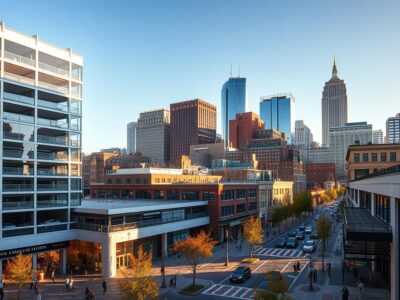Boston is on the cusp of a transformative phase, with significant property developments poised to reshape its urban landscape by 2025. From new residential complexes to vibrant commercial spaces, the city’s property market is buzzing with activity, signaling robust growth and modernization.
In recent years, the Boston Planning and Development Agency has approved over 170 projects, leading to the creation of approximately 13,000 homes, with more than 4,000 units designated as income-restricted1. This surge in new construction Boston projects underscores the city’s commitment to fostering sustainable and inclusive urban growth.
With $100 million allocated towards housing developments to speed up the approval process and encourage investment, Boston is setting the stage for a dynamic real estate future1. The diverse array of projects spans across various neighborhoods, each contributing to the overall vision of a more connected and thriving city.
Upcoming projects like the Suffolk Downs redevelopment, which includes the eight-story Amaya building with 475 residential units, exemplify the scale and ambition of these new undertakings2. This extensive initiative aims to introduce over 10,000 condominiums and apartments upon completion, alongside an array of public amenities2.
Key Takeaways
- The Boston Planning and Development Agency has approved over 170 projects since 2022, leading to approximately 13,000 new homes1.
- Over 4,000 of these homes are income-restricted, reflecting a commitment to inclusivity1.
- The city plans to allocate $100 million to expedite and support new housing developments1.
- The Suffolk Downs redevelopment project will feature over 10,000 new housing units and extensive public amenities2.
- Boston’s property developments in 2025 will address both residential and commercial needs.
Introduction to Property Developments in Boston
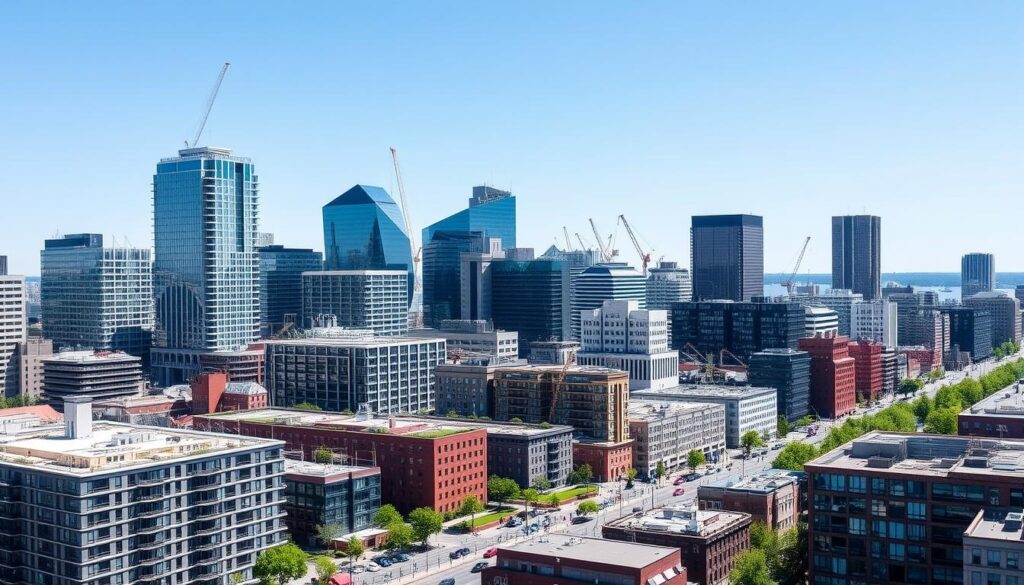
Boston’s thriving real estate market is continually evolving, driven by real estate development Boston initiatives aimed at enhancing both residential and commercial spaces. With a current population of 700,000 in the city and 4.34 million in the Boston metropolitan area, the growth rate has been steady at 0.39% since 20223. This urban development Boston is essential to cater to the growing demand.
Overview of Recent Trends
Recent trends in development projects Boston indicate a balanced focus on both residential and commercial expansions. Boston’s rental market remains robust, with a 5.5% vacancy rate and an average rent of $1,941 for a one-bedroom apartment3. Developments such as The Mezz South Boston, with its 43 residential units and modern amenities, reflect the city’s commitment to meeting diverse housing needs4. Notably, over 50% of these units were under agreement pre-completion, demonstrating strong demand4.
Importance of New Developments
New development projects Boston are crucial in sustaining the city’s economic vitality. The median listing home price in Boston was $799K as of December 2022, indicating a healthy real estate market3. Furthermore, the city’s commitment to creating affordable housing through lottery processes for first-time homebuyers ensures inclusivity and supports community growth5. Additionally, large-scale projects significantly contribute to local job creation and infrastructure enhancement, fostering a more vibrant and economically resilient urban development Boston.
Residential Property Development in Boston
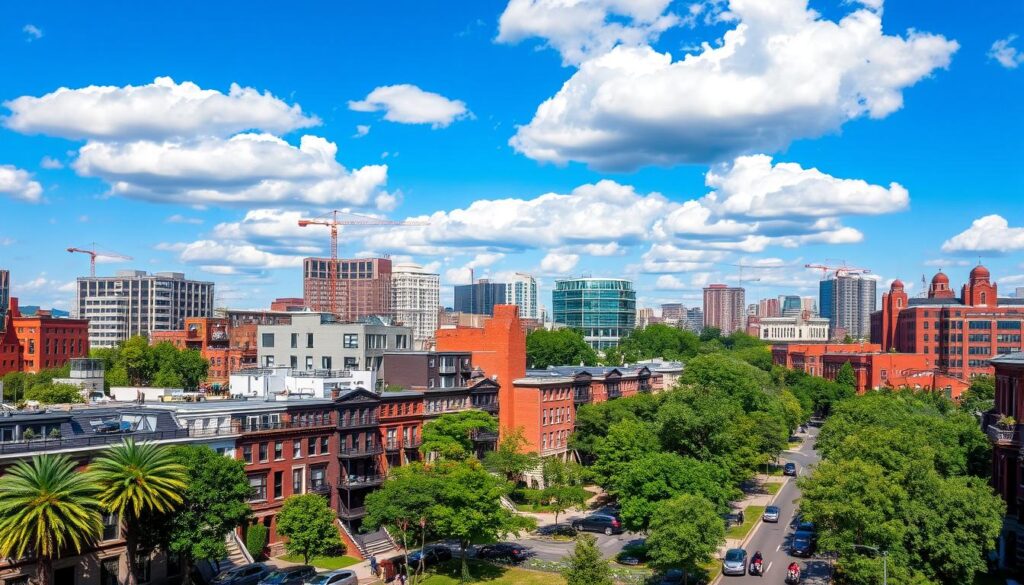
Residential property development in Boston continues to evolve with exciting new projects on the horizon. The city’s initiative to boost the housing stock integrates both luxurious new homes Boston as well as affordable housing Boston solutions, meeting diverse community needs.
Upcoming Residential Projects
Boston Residential Group, active in urban real estate development since 2003, focuses on distinctive properties, partnering with institutional investors to deliver outstanding results6. Their portfolio of apartment and condominium developments showcases higher than average occupancy rates6. One notable development is the transformation of underutilized lots into vibrant residential complexes with premium multifamily market products. The company’s projects have low tenant turnover rates, half the industry standard, underscoring the quality of their developments6
Focus on Affordable Housing
Affordable housing Boston remains a priority in the city’s residential property development strategies. There is a notable effort to integrate affordable units within luxury developments, ensuring inclusive growth. Boston Residential Group has consistently exceeded financial expectations in joint venture developments, receiving positive feedback from partners and customers, especially for their high-quality finishes and amenities6. This approach is not just about adding more houses but creating a sustainable living environment where the quality and cost of living are balanced.
Commercial Property Developments: Offices & Retail Spaces
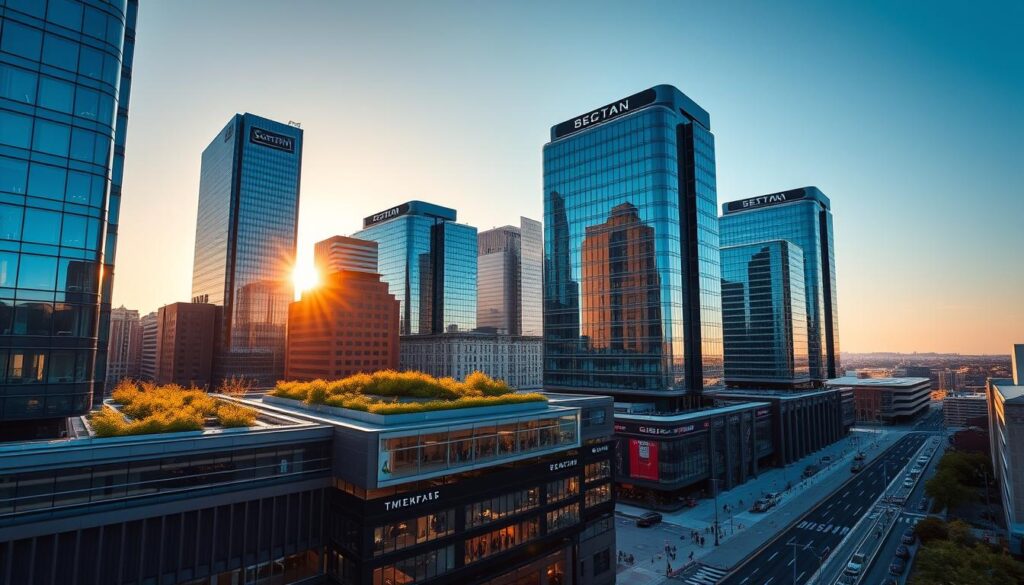
Boston is seeing a significant transformation with new office buildings and retail space development Boston projects aimed at meeting the increased demand for commercial property. The Seaport district, in particular, has been a focal point, witnessing over $22 billion of public investment, leading to a thriving ecosystem of over 350 companies, from global tech giants to innovative startups7.
New Commercial Projects
Several new office buildings in Boston are shaping the city’s skyline. One Boston Wharf Road is a mixed-use building that includes 707,000 square feet, with Amazon leasing 630,000 square feet dedicated to office spaces7. Another notable project is the 111 Harbor Way, which spans 480,000 square feet and is LEED Gold certified. This building features 430,000 square feet of office space, with the first two stories reserved for retail and restaurants7.
Additionally, the 400 Summer Street project includes a 630,000 square foot, 16-story laboratory building, predominantly occupied by Foundation Medicine with 600,000 square feet of laboratory space7. The Fenway Corners project, managed by WS, spans approximately 5 acres next to Fenway Park and integrates community-centered activities while respecting historical significance7.
Impact on Local Economy
The surge in commercial property developments in Boston is poised to significantly impact the local economy. With entities like CBRE New England, the region’s largest full-service commercial real estate company, striving to meet the real estate needs with over 450 employees8, the local job market is expected to benefit substantially. The retail space development Boston has seen, such as the Kings Plaza shopping center’s sale for $14.2 million8, highlights ongoing investment in commercial properties that stimulate economic growth.
These developments are not just limited to conventional office spaces. The evolving commercial landscape includes multipurpose buildings that blend office and retail functions, enhancing the overall business environment in Boston. Such projects create thousands of jobs, boost retail and commercial services, and attract further investments, ultimately contributing to Boston’s economic prosperity.
Notable Development Projects in 2025
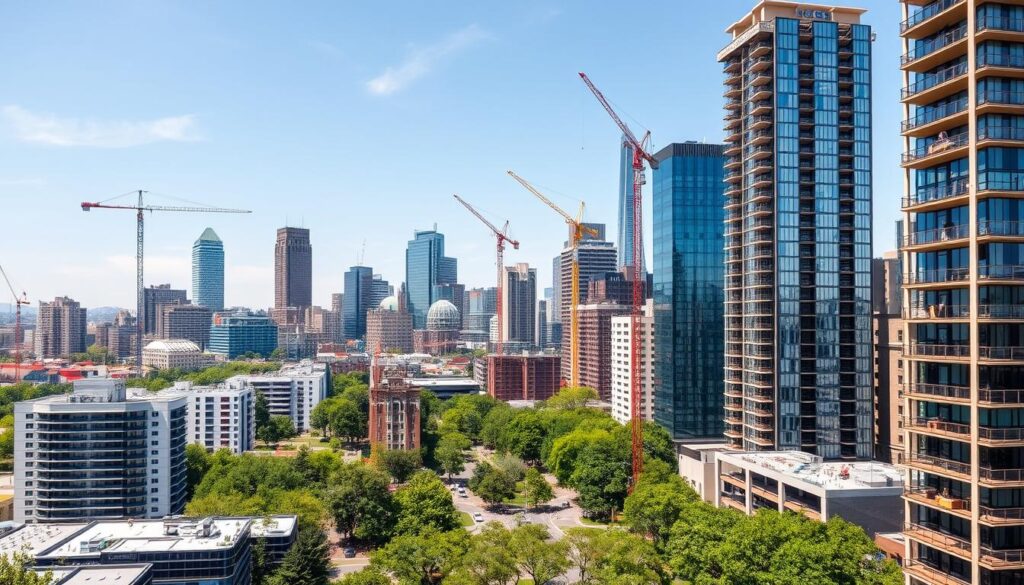
Boston’s real estate market is booming with a range of development projects set for completion in 2025. These projects are expected to contribute significantly to the city’s urban landscape, provide more residential and retail spaces, and enhance community engagement.
White Stadium Renovation
The much-anticipated renovation of White Stadium Boston is set to transform the iconic sports venue into a modern community hub. This renovation aims to provide enhanced sports facilities and community spaces, ensuring the stadium becomes a central feature in Boston’s urban life.
112-114 Queensberry Street Project
Development projects in Boston also include the creation of affordable homes at 112-114 Queensberry Street. This project is dedicated to addressing the city’s housing needs by offering affordable living options to Boston residents while promoting inclusivity and diversity9.
2 Charlesgate West Development
The ambitious plan for 2 Charlesgate West involves a large-scale residential and retail project. This development will not only provide ample living spaces but also integrate retail facilities to serve the local community. The aim is to create a vibrant, mixed-use area that contributes to the overall appeal and functionality of this part of Boston10.
These projects, along with others like the Boston Planning and Development Agency’s initiative, are a testament to the city’s commitment to growth and sustainability. With each project, Boston continues to enhance its urban environment, make strides in affordable housing, and provide spaces that cater to the needs of its diverse population.
Spotlight on the Former Naval Blood Research Laboratory
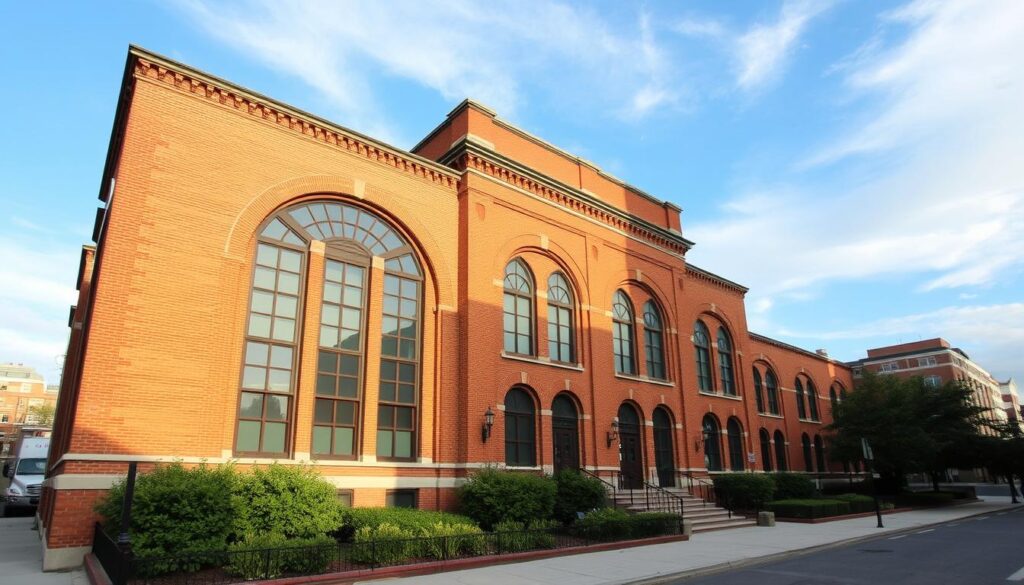
The transformation of the former Naval Blood Research Laboratory Boston stands as an exemplary model of adaptive reuse in urban development. This historic site, rich in its past, is being converted into a multifaceted space featuring residential apartments and retail spaces. The project, one of Boston’s ambitious redevelopment initiatives, aims to blend modern living with the preservation of historical architecture.
This innovative apartment conversion in Boston is anticipated to draw significant attention due to its prime location and the seamless integration of retail spaces Boston, providing a well-rounded urban living experience. By transforming an old research facility into a modern residential complex, developers are not only creating new housing but also revitalizing the neighborhood with contemporary amenities and services.
The significance of this project is underscored by the historical context of the building. Originally, the Naval Blood Research Laboratory focused on a range of medical research projects, including a notable percentage of articles “Under Review” at 60% for various scientific contributions11. The site’s rebirth as a residential and commercial hub is part of a broader trend in Boston, which has seen an increase in property tax for lower-income homeowners by 10.4% in 202512, further emphasizing the need for innovative housing solutions.
Moreover, the implementation of such projects contributes significantly to local economic growth. The newly available retail spaces Boston within the converted building will provide opportunities for new businesses and job creation. This holistic development approach aims to sustain Boston’s reputation as a city that values both historical preservation and modern advancement.
As Boston continues to evolve, projects like the Naval Blood Research Laboratory Boston conversion serve as vital landmarks. They reflect the city’s commitment to adaptive reuse, providing dynamic living spaces while honoring the historical essence of its buildings. The project also aligns with Boston’s comprehensive urban planning strategies, which include collaborations with institutions like Massachusetts General Hospital and Harvard Medical School to offer ongoing research opportunities in conjunction13.
In conclusion, the transformation of the former Naval Blood Research Laboratory into a place that accommodates both residential apartments and retail offerings is a testament to the city’s innovative spirit. It ensures that historical buildings are not relegated to obsolescence but are repurposed to meet contemporary needs, thereby enriching Boston’s urban fabric.
Investment Opportunities in Boston Real Estate
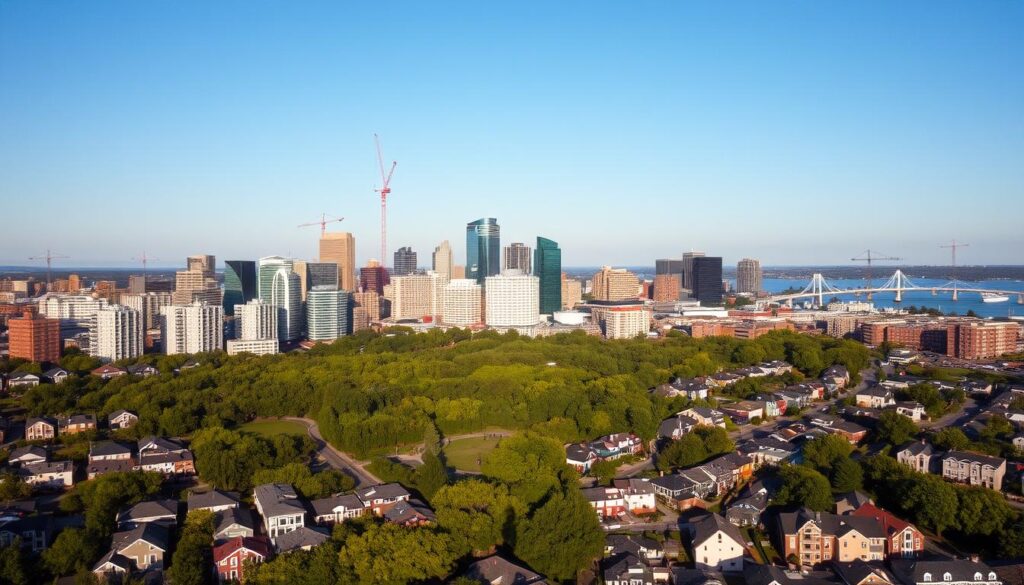
The Boston real estate market continues to offer lucrative investment opportunities, attracting both local and international investors. Sectors with high growth potential, such as residential and mixed-use developments, are particularly promising for those interested in investment properties Boston. Understanding current trends and areas of demand is crucial for maximizing returns.
Alpine Property Group, founded in 2016, specializes in multi-family and mixed-use real estate investments in the heart of Boston. The firm focuses on value and opportunity-driven investments, targeting areas where demand exceeds supply14. This strategy allows for quick deal closures, often within a week for off-market opportunities, ensuring timely capital deployment14.
Investing in the Boston real estate market requires a keen eye on various indicators. For instance, analyzing interest rates and understanding demographic trends can offer insights into areas poised for growth. Collaboration with local experts also provides an added edge when investing in this competitive market.
Comparing key metrics can unveil the attractiveness of specific investment options:
| Metric | Alpine Property Group | Market Average |
|---|---|---|
| Portfolio Value | $1B+ | Varies |
| Number of Properties | 14 | Varies |
| Total Square Feet | 3M | Varies |
| Tenant Partners | 25+ | Varies |
| Occupancy Rate at 85 John Rd | 100% | Varies |
Engaging in real estate investments Boston is not limited to residential projects. Commercial opportunities, such as the new lease signed at Axis Park North in Billerica, which spans 31,000 square feet, also present significant returns15. As the market evolves, savvy investors recognize the potential for stable income and asset appreciation in both sectors.
For comprehensive insights into the Boston real estate market and investment opportunities, exploring diverse neighborhoods and seeking professional guidance are vital. Additionally, considering alternative cities in Massachusetts like Cambridge, Worcester, and Springfield can offer similar high-growth possibilities. To delve deeper into the investment landscape, visit the Boston real estate market page for more information14.
Urban Development Initiatives by the Boston Planning and Development Agency
The Boston Planning and Development Agency (BPDA) plays a pivotal role in shaping the city’s urban landscape through strategic planning and innovative initiatives. Their dedication to sustainable urban growth and community involvement ensures that Boston remains a progressive and inclusive city.
Roles of the BPDA
In 2024, the BPDA had a total budget allocation of $32,679,27916, funding a wide range of urban development initiatives. For 2025, capital budget expenditures are projected at $600,00016. These funds are allocated to several high-priority projects, including climate change-related improvements at Long Wharf and the development of ferry service plans from Pier 10 to North Station16.
The BPDA is also focused on engineering solutions for resilience against flooding, particularly in the North End and Downtown Boston16. Specific authorizations for Long Wharf Resilience Solutions in Downtown/Government Center amount to $3 million for FY2516. Additionally, expenditures for the RLFMP Resiliency Improvements project in South Boston planned for 2026-2029 are slated at $3,075,00016.
Community Engagement and Feedback
Community planning in Boston is a cornerstone of the BPDA’s strategy. Their efforts have led to the successful completion of over 3,000 housing units developed through the Planning Office for Urban Affairs in affiliation with the Roman Catholic Archdiocese of Boston17. Investment in neighborhoods across metropolitan Boston exceeds $650 million, showcasing the agency’s commitment to regional development17.
Projects like the 19-story residential tower in downtown Boston will provide 70 units of permanent supportive housing for individuals experiencing homelessness17. Highlighting the focus on family housing, the Morton Station Village project has achieved national recognition and nominations under multiple categories in the Affordable Housing Finance 2024 Reader’s Choice Awards17.
Furthermore, the BPDA collaborates with organizations such as the Caribbean Integration Community Development, Inc., to deliver projects like the 150 River Street Village, which will create 30 units of affordable and mixed-income housing for seniors in Mattapan17. This commitment to community engagement and feedback ensures that the voices of Boston’s residents are integral to the planning and development process.
Green and Sustainable Building Practices
Boston has been committed to sustainable building practices, and this can be observed through their diverse initiatives that marry urban growth with environmental responsibility. A significant aspect of these initiatives is the incorporation of LEED certification in new projects and the adoption of eco-friendly building techniques and materials.
LEED Certification in New Projects
For new residential and commercial developments, gaining LEED certification Boston is increasingly becoming a standard benchmark. This certification ensures that buildings meet specific criteria for reducing carbon footprints and are constructed using sustainable practices. Boston’s determination to achieve these standards highlights its commitment to eco-friendly buildings Boston. Such certifications are not just about achieving green credentials but also about the long-term benefits, like lower energy and water expenses. Notably, green buildings account for 37% of all energy use and 68% of all electricity demand in the United States, while also consuming 30-40% less energy compared to conventional buildings, thus yielding 20-50% lower energy bills18.
Eco-friendly Initiatives
Boston’s eco-friendly initiatives extend beyond new developments. The Boston Housing Authority actively involves residents in sustainable projects through various programs. Notable examples include the Smoke-Free Housing Initiative and the AMP Up program, which connects residents to green job opportunities19. Furthermore, initiatives like the Energy Positive Housing Program are being implemented to enhance existing housing stock for energy efficiency and climate resilience sustainable building practices Boston.
New construction projects are increasingly incorporating renewable and recycled materials such as bamboo, straw, and on-site originated materials to minimize transport-related greenhouse gases. These materials are important in reducing the overall carbon footprint of the buildings. With 38% of carbon dioxide emissions in the U.S. being attributed to residential houses20, it’s crucial to emphasize these sustainable approaches. Moreover, technologies like solar panels, wind power, and hydropower are integrated into buildings to minimize environmental impact, ensuring that eco-friendly buildings Boston are not only energy efficient but also promote renewable energy use20.
Government Support and Policies for Property Development
The Boston government has been actively involved in shaping and supporting property development regulations in Boston. A significant player in this initiative is the Mayor’s Office of Housing. This office collaborates with the Policy Development and Research Division to drive programs that bolster the local housing market.
Role of the Mayor’s Office of Housing
The Mayor’s Office of Housing focuses on various policy frameworks and initiatives to manage the housing crisis in Boston. The office plays a crucial role in disbursing funds and implementing policies that aim to create affordable housing options and prevent displacement of residents. Boston stands to receive $500 million from the federal government from the American Rescue Plan (ARP) by 2025, with $200 million dedicated to housing programs21. These funds will be used to build new, deeply-affordable housing and to support existing properties against displacement.
In addition, the Mayor’s Office of Housing regularly updates Boston’s existing policies and programs to reflect current market conditions. One such effort includes pushing for higher density housing near major transit corridors, which aims to alleviate housing shortages and reduce rent burdens21. This is particularly critical given that half of Boston’s renters are rent-burdened, paying more than 30% of their income towards rent21.
New Regulations and Approvals
Several new regulations are in place to streamline property development in Boston. One of the significant changes is the implementation of full tax abatement on all construction projects, which would lead to a 40% increase in new construction resulting in almost 1,900 units22. This regulatory policy is aimed at increasing the net operating income per unit by approximately $6,000 a year or $190,000 in present value22.
Furthermore, the city has updated its Inclusionary Development Policy (IDP) to increase affordable housing requirements. This update requires new commercial and residential developments to include a higher percentage of affordable units, thereby ensuring that more residents have access to affordable living spaces21. Additionally, Boston is exploring a vacancy tax to discourage commercial speculation and pushing for a pilot municipal homeownership voucher program to support residents with Section 8 vouchers21.
The Housing Accelerator Fund: A Boost for Affordable Housing
The Housing Accelerator Fund Boston is set to invigorate affordable housing initiatives Boston, with a substantial $110 million boost proposed by Mayor Michelle Wu23. This initiative is designed to bridge the financing gaps for approved projects yet to start, leveraging surplus funds from previous budgets. Additionally, the fund will be augmented by the state’s Momentum Fund, part of the $5.1 billion Affordable Homes Act signed by Governor Maura Healey, matching the city’s contribution23.
By collaborating closely with state funds, this public-private partnerships Boston focus aims to rejuvenate the city’s housing market. Notably, the Bunker Hill Redevelopment project in Charlestown is the first to benefit, transitioning from approximately 1,110 public housing units to a mixed-income community including 2,699 units23. Ground was broken for the first building in June 2023, with further construction planned for a nine-story, 265-unit mixed-income building starting in mid to late 202523.
In addition, the Housing Accelerator Fund Boston will provide up to $100 million for equity investments in multifamily residential projects, addressing the city’s approval of over 23,000 housing units pending construction due to economic constraints24. These funds aim to stimulate building projects and expand the tax base, providing returns to the city over time.
City and state officials will collaborate on identifying projects that align with affordability, climate resilience, and equity goals23. With the initiative’s launch, developers see potential, although precise project criteria remain undeveloped24. However, the inclusion of public-private partnerships Boston is expected to bolster trust and participation, fostering a collaborative environment for both public and private sectors.
Furthermore, the fund will maintain a sustainable cycle by reinvesting profits back into new housing projects, ensuring continuous support for affordable housing initiatives Boston25. This ongoing reinvestment strategy addresses long-term housing needs and reflects the city’s commitment to solving its housing crisis.
The initial phase of the Bunker Hill Housing complex redevelopment, conducted by Leggat McCall Properties and the Boston Housing Authority, highlights the city’s strategic focus. The plan will transition roughly 1,000 public housing units to nearly 3,000 units, including public housing, market-rate, and affordable units25. This project exemplifies the impactful role of the Housing Accelerator Fund in revitalizing Boston’s housing landscape.
Major Milestones for Boston’s Real Estate in 2025
As Boston heads into 2025, several key dates and significant real estate events Boston will shape the landscape. The upcoming year will witness numerous Boston real estate milestones that will impact both residential and commercial sectors significantly.
Key Dates and Events
Among the significant real estate events Boston will see, the major milestones include the completion of notable projects like the White Stadium Renovation and the 112-114 Queensberry Street Project, both of which promise to enhance community infrastructure. The 2 Charlesgate West Development is also anticipated to be a noteworthy addition to Boston’s skyline. These projects represent significant real estate events Boston as they aim to modernize and expand urban living spaces.
Projected Growth Statistics
Analyzing the real estate growth statistics Boston, the office property values in the city are predicted to experience a 32.21% decline in 2023, reflecting shifts in the market dynamics26. Despite these challenges, the expected home price changes in Massachusetts regions by September 2025 highlight positive trends: Worcester at 2%, Springfield at 1.5%, and Barnstable Town at 2.7%27.
Additionally, Boston’s overall vacancy rates are recorded at 22.9%, showcasing a competitive rental market26. Meanwhile, single-family home listings surged by 23% in 2024, reflecting a significant year-over-year increase27.
| Metric | Statistic | Time Frame |
|---|---|---|
| Real Estate Value Change | -32.21% | 2023 |
| Overall Vacancy Rates | 22.9% | Q1 2024 |
| Single-Family Home Listings | +23% | September 2024 |
| Home Price Change in Worcester | 2% | September 2025 |
Property Developments Boston: Summary of Key Projects
Boston’s real estate landscape is undergoing significant transformation with various key property developments shaping the city’s future. These projects span residential and commercial sectors, offering insights into major residential projects Boston and significant commercial properties Boston. In this section, we encapsulate some of the noteworthy highlights.
Residential
The Boston Planning & Development Agency (BPDA) has approved two new development projects that collectively cover around 111,230 square feet. These initiatives will produce 82 residential units, with 56% earmarked as income-restricted housing, which will support approximately 96 construction jobs and nine permanent jobs28. A notable project is the redevelopment of Parcel P-12C in Roxbury, proposing 119 total income-restricted units along with community or commercial space. Meanwhile, projects at 2 Ford Street and 970 Saratoga Street will add 41 residential units, including seven income-restricted ones, supporting about 42 construction jobs and eight permanent jobs28.
Moreover, the construction at 1471 Blue Hill Avenue in Mattapan will offer 41 income-restricted rental units featuring 48% on-site renewable energy and space for community engagements28. Furthermore, the BPDA approved updates for projects like Allston Square and Nubian Square Ascends to modify unit types and increase the number of income-restricted units, contributing to key property developments Boston28.
Commercial
In the realm of significant commercial properties Boston, Eversource’s proposal includes constructing a new underground substation in Kendall Square with eight new underground transmission lines interconnected to existing substations. The Boston Properties MXD Project encompasses a 420,000-square-foot housing building, two 400,000-square-foot commercial buildings, and a new open space. Additionally, a 500,000-square-foot, 16-story mixed-use building is planned for the intersection of Third and Kendall Streets29. MIT’s Kendall Common initiative will contribute nearly 3 million square feet of mixed-use space including retail, housing, science facilities, and open spaces29.
There are also developments in the South End with the project at 1000 Washington Street, which aims to convert an existing office building into a life science use facility, supporting job creation and Zero Net Carbon goals28. Utility work on Land Boulevard began in August 2023 and is expected to conclude with final repaving in Spring 202529.
For a more detailed overview of these initiatives and ongoing community engagement, visit the Cambridge Redevelopment Authority website28.
Conclusion
In summary, property developments in Boston are poised to reshape the city’s landscape significantly, with a robust pipeline of both residential and commercial projects set to advance the future Boston real estate market. The introduction of modular housing, which delivers projects 40% faster and at a substantially lower cost compared to traditional methods, highlights the innovative approaches being adopted to tackle the city’s housing needs30. As the city strives to meet the projected 200,000 new housing units needed through 2030, it is crucial to address the challenges of rising construction costs and limited building permits, which are currently only around 10,000 issued annually30.
The costs involved in developing new properties in Boston are significant, with labor and materials accounting for 75 to 80% of the total project costs, and green energy codes adding an estimated 5 to 10%30. These financial factors contribute to the high prices of new housing units, which range between $500,000 to $600,000 per unit30. In the commercial sector, the downward trend in property values, as demonstrated by the dramatic 74% reduction in the sale price of the office building at 33–41 West Street from $16 million to $4.1 million in the span of eight years, underscores the volatility and potential risks in the current market31.
Looking ahead to the 2025 property outlook Boston, the focus on sustainable building practices, government initiatives, and the community-centric approach suggested by advocates like Michelle Wu will be pivotal. Wu’s proposal to dismantle the Boston Planning and Development Agency to create a more accountable Planning Department emphasizes the need for enhanced transparency and community engagement in urban development30. As Boston navigates these transformations, the developments discussed are expected to significantly enhance both the quality of life and economic vitality, strengthening the city’s position as a thriving, dynamic metropolis. This comprehensive outlook ensures that Boston remains a competitive and vibrant place to live and work, catering to diverse housing needs and fostering economic growth.
FAQ
What are the major residential property developments planned for Boston in 2025?
There are several significant residential property developments slated for completion in 2025, including large-scale projects like the transformation of underutilized lots into vibrant residential complexes and the inclusion of affordable housing units within luxury developments. Examples include the fully affordable homes at 112-114 Queensberry Street and the large-scale residential project at 2 Charlesgate West.
How will the new commercial property developments impact Boston’s local economy?
The new commercial property developments, such as new office buildings and retail spaces, are expected to greatly impact Boston’s local economy by creating jobs, boosting retail services, and accommodating growing business demands. This economic surge will enhance community facilities and drive further urban development.
What are the notable development projects in Boston for 2025?
Some key development projects in Boston for 2025 include the major renovation of White Stadium to enhance community use and sports facilities, the creation of fully affordable homes at 112-114 Queensberry Street, and the large-scale residential and retail project at 2 Charlesgate West.
What is the Boston Planning and Development Agency’s role in these developments?
The Boston Planning and Development Agency (BPDA) plays a critical role in shaping Boston’s urban landscape. They are involved in various urban development initiatives, ensuring sustainable development practices and community involvement in the planning process to create a cohesive and thriving urban community.
Are there any adaptive reuse projects included in Boston’s 2025 developments?
Yes, one of the significant adaptive reuse projects is the transformation of the former Naval Blood Research Laboratory into a residential building with retail spaces. This project highlights Boston’s commitment to preserving historical buildings while repurposing them to meet modern needs.
What investment opportunities are available in Boston’s real estate market?
Boston’s evolving real estate market offers lucrative investment opportunities, particularly in residential and mixed-use developments. Investors can benefit from the high growth potential in these sectors, driven by the ongoing urban development and increasing demand for diverse property types.
How is Boston promoting green and sustainable building practices?
Boston has a strong commitment to sustainability, actively integrating green building practices in new developments. This includes pursuing LEED certifications for new projects and adopting eco-friendly building techniques and materials to promote a healthier and more sustainable urban environment.
What government support and policies are in place for property development in Boston?
Various government frameworks support property development in Boston, with critical involvement from the Mayor’s Office of Housing. Recent regulatory changes aim to streamline development processes, making it easier and faster to approve and implement new projects.
How does the Housing Accelerator Fund contribute to affordable housing in Boston?
The Housing Accelerator Fund significantly boosts the development of affordable housing in Boston by providing financial support and resources to fast-track these projects. This initiative helps meet the city’s growing demand for affordable housing and fosters public-private partnerships.
What are some key dates and events for Boston’s real estate sector in 2025?
Key dates and events for Boston’s real estate sector in 2025 will include various milestones such as project completions, groundbreaking ceremonies, and regulatory approvals. These events will signal significant progress and expansion in both residential and commercial property developments.
Source Links
- https://www.masslive.com/news/2024/09/boston-accelerates-development-with-100m-for-housing-new-review-process.html
- https://www.bostonreb.com/new-boston-condo-developments/
- https://www.doorstead.com/blog/a-comprehensive-overview-of-bostons-housing-market-for-homeowners-and-renters-in-2023
- https://bostonpropertydevelopment.com/invest/
- https://www.boston.gov/departments/housing/neighborhood-homes-initiative
- https://www.bostonresidentialgroup.com/
- https://www.wsdevelopment.com/our-properties/
- https://www.cbre.com/offices/corporate/boston
- https://www.boston.com/real-estate/the-boston-globe/2024/11/01/a-new-boston-development-is-prioritizing-first-generation-home-buyers-it-could-help-close-the-racial-wealth-gap/
- https://www.thecrimson.com/article/2024/11/1/allston-post-office-construction/
- https://enme.umd.edu/clark/faculty/545/JinOh-Hahn
- https://www.bostonglobe.com/
- https://lifesciences.fas.harvard.edu/undergraduates-open-research-positions-projects
- https://alpinepropertygroupllc.com/
- https://www.camberdev.com/
- https://content.boston.gov/sites/default/files/file/2024/09/V3 19- 25 A Planning-Cabinet.pdf
- https://poua.org/
- https://nyujlpp.org/wp-content/uploads/2012/10/Burke-Nelson-Rickerson-Bostons-Green-Affordable-Housing-Program.pdf
- https://www.bostonhousing.org/en/Departments/Planning-and-Real-Estate-Development/The-BHA-and-Sustainability-(1)/Sustainable-Communities.aspx
- https://generalcontractorsboston.com/green-building/
- https://www.michelleforboston.com/plans/housing-justice/
- https://www.bostonfed.org/publications/current-policy-perspectives/2024/addressing-housing-shortages-through-tax-abatement.aspx
- https://bostonagentmagazine.com/2024/11/27/boston-mayor-aims-to-create-110m-housing-accelerator-fund/
- https://www.bostonglobe.com/2024/09/25/business/wu-housing-construction-fund-100-million/
- https://bankerandtradesman.com/state-to-match-110m-boston-housing-accelerator-fund/
- https://masstaxpayers.org/sites/default/files/publications/2024-06/MTF Future of Downtown Real Estate_0.pdf
- https://www.noradarealestate.com/blog/boston-real-estate-market/
- https://bostonrealestatetimes.com/bpda-approves-new-development-projects/
- https://www.cambridgema.gov/Departments/publicworks/news/2021/03/kendallsquareconstructionprojects
- https://apps.bostonglobe.com/2023/10/special-projects/spotlight-boston-housing/construction-costs/
- https://www.bostonmagazine.com/news/2024/05/26/boston-doom-loop/

